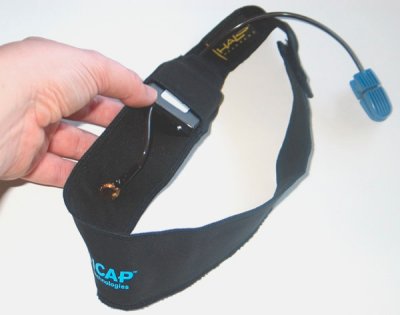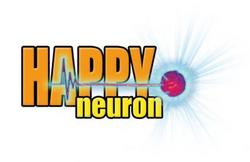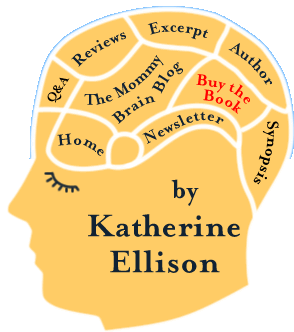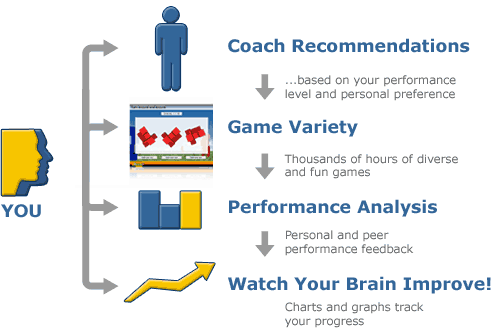Yawn to Cool Down, Focus and Power-Up Mentally
 The role of yawing in cognitive performance is being rethought.
The role of yawing in cognitive performance is being rethought.
We yawn to cool our brains and crank up our mental alertness. Keeping the brain cool, like keeping a computer cool, is critical for efficient operation. In short, yawing will boost your cognitive performance not dull it.
The process works by moving blood into the brain.
For an excellent (and short) explanation of the new science of yawing and how to put it to use check out The 3-Second Energy Boost. I especially like the suggestions for how to bring on a yawn including thinking about one (they are contagious) and faking one.
The key for readers of the Next Brain Blog is that yawing is an important means of naturally maintaining mental efficiency. Don’t want to stifle that.
Categories: Lifestyle, Mental Focus Tags:
Silence at the Right Time Improves Cognition
 A Psychology Today blog has an excellent post on the effective use of silence. It is a good reminder that just being quiet often gives the brain a chance to work well. Being silent can improve your listening skills, self control and even your attractiveness to others. The key is to know when to get into the quiet zone – for example, when you are angry or when someone else is speaking.
A Psychology Today blog has an excellent post on the effective use of silence. It is a good reminder that just being quiet often gives the brain a chance to work well. Being silent can improve your listening skills, self control and even your attractiveness to others. The key is to know when to get into the quiet zone – for example, when you are angry or when someone else is speaking.
When it comes to exercising the power of silence to achieve self-control the author writes:
“Think how much more in control you’d not only appear but actually be if your first response upon hearing or seeing something that sparks a strong reaction in you wasn’t to lash out emotionally but instead to become–silent. Silence is a terrific substitute for self-control, not only creating its appearance, but over time and with practice its substance as well.”
Although similar to the “count to 10 rule” for managing anger it is a bit different. The idea is to focus on being silent or learning to get into the quiet zone.
Interested to hear from readers that practice the power of silence and how it has helped them be more effective.
Categories: Ancient Ways, Executive Function, Lifestyle, Manage Emotions Tags:
Medical Grade Neurofeedback at Home for $995
 Neurofeedback is one of the most promising techniques we have for improving brain function and cognitive performance through systematic training. As we have discussed on the Next Brain Blog before:
Neurofeedback is one of the most promising techniques we have for improving brain function and cognitive performance through systematic training. As we have discussed on the Next Brain Blog before:
Neurofeedback training devices translate brainwaves into an external signal such sounds, graphs on a computer screen, movement of your computer’s cursor, action in a video game and even the motion of remote controlled toys.
Getting access to professional grade equipment can be very expensive. Consumer devices such as Neurosky’s headset or Emotiv’s EPOC (both of which I own) cost just a few hundred dollars but have limited functionality.
The market might be changing.
ICAP Technologies is offering the ICAP Release Meter, a professional grade neurofeedback system for $995. To get this price you need to use the coupon code available on the Mindware Forum. The Mindware Forum offers a good review of ICAP including a video interview.
Interested to hear from readers that have used the ICAP system or any at-home EEG-based neurofeedback training device.
Categories: Manage Emotions, Memory and Learning, Mental Focus, Software, Training Tags: brain training, neurofeeback
Preventing Cognitive Decline – No Science Yet!
 The state of the science conference sponsored by the National Institute of Heath on Preventing Alzheimer’s and Cognitive Decline is over. You can read an excellent recap in the LA Times or read a draft of the conference statement. For readers of the Next Brain Blog, a key finding is:
The state of the science conference sponsored by the National Institute of Heath on Preventing Alzheimer’s and Cognitive Decline is over. You can read an excellent recap in the LA Times or read a draft of the conference statement. For readers of the Next Brain Blog, a key finding is:
we have not done enough scientific research (large scale population based studies) to know what really works.
But the committee goes on to say:
“Some preliminary research suggests that a few prevention strategies could emerge as helpful, according to the report. These include programs that train people in memory, reasoning and speed of thinking as well as omega-3 fatty acid supplementation, physical activity and a diet low in saturated fat and high in fruits and vegetables.”
We have covered and will continue to cover all of these techniques.
Categories: Cognitive Decline, Older Adult Tags:
Boost Happiness by 25% with Simple Gratitudes
 By consciously cultivating a sense of gratitude you can improve happiness by 25%. While this does not raise your IQ it definitely raises you emotional quotient or EQ by developing skills in recognizing and managing emotions.
By consciously cultivating a sense of gratitude you can improve happiness by 25%. While this does not raise your IQ it definitely raises you emotional quotient or EQ by developing skills in recognizing and managing emotions.
But how do you cultivate gratitude? For some excellent practical tips check out Enhance Happiness and Health by Cultivating Gratitude: Interview with Robert Emmons. Some examples:
“The most common method we use in our research is to ask people to keep a “Gratitude Journal” where you write something you feel grateful for. Doing so 4 times a week, for as little as 3 weeks, is often enough to create a meaningful difference in one’s level of happiness. Another exercise is to write a “Gratitude Letter” to a person who has exerted a positive influence on one’s life but whom we have not properly thanked in the past, and then to meet that person and read the letter to them face to face.”
I am interested to hear from readers that use specific techniques for building EQ through practicing gratitudes.
Categories: IQ and EQ, Lifestyle, Manage Emotions Tags: EQ, experiential learning, smart phone
Best Evidence for Improving Brain Health
 The Alzheimer’s Association working in conjunction with the National Institute for Health has a established a website to keep citizens up to date on what the latest scientific evidence has to say by brain health. The site Maintain Your Brain, recommends eating a brain-healthy diet and staying physically, mentally and social active. Techniques we have covered elsewhere in the Next Brain Blog.
The Alzheimer’s Association working in conjunction with the National Institute for Health has a established a website to keep citizens up to date on what the latest scientific evidence has to say by brain health. The site Maintain Your Brain, recommends eating a brain-healthy diet and staying physically, mentally and social active. Techniques we have covered elsewhere in the Next Brain Blog.
Of special interest is the 70-page National Public Roadmap for Maintaining Cognitive Health (this a 2.5 MB file) and the Interactive Tour of the Brain. The tour is quick and easy but informative. It provides basic knowledge of the brain and Alzheimer’s disease.
A few minutes on the site provides strong motivation for considering the long-term health of your brain and what needs to be done today. To quote the site:
“When people think about staying fit, they generally think from the neck down. But the health of your brain plays a critical role in almost everything you do: thinking, feeling, remembering, working, and playing – even sleeping.”
Interested to hear from readers on what specific things they are doing to maintain brain health.
Categories: Cognitive Decline, Diet, Lifestyle Tags:
Benchmark Your Cognitive Fitness with Precision
 According to a recent press release, Happy Neuron, a brain training company has amassed a database of some 50 million training results. This is the biggest database of its kind and allows them to compare your cognitive training results to peers more precisely than anyone else on the market.
According to a recent press release, Happy Neuron, a brain training company has amassed a database of some 50 million training results. This is the biggest database of its kind and allows them to compare your cognitive training results to peers more precisely than anyone else on the market.
Happy Neuron uses games to train your brain. They have games for attention, language, memory, visual-spatial and executive function.
I am interested to hear from readers that use Happy Neuron’s products.
Categories: Executive Function, Memory and Learning, Software, Training Tags: brain training, games
Neurobics: Low-Effort Cognitive Stimulation!
 Neurobics is a unique approach to brain training developed from the latest findings in neurobiology. According to one popular approach, Keeping Your Brain Alive, the core idea is this:
Neurobics is a unique approach to brain training developed from the latest findings in neurobiology. According to one popular approach, Keeping Your Brain Alive, the core idea is this:
“Neurobic exercises use your five physical senses and your emotional sense in unexpected ways and encourage you to shake up your everyday routines. Neurobics don’t require paper and pen or isolating yourself with puzzles. Everyday life is the Neurobic Brain gym. They can be done anywhere, anytime in offbeat, fun and easy ways while you’re getting up, commuting, working, eating, shopping or relaxing. They are designed to help the brain manufacture its own nutrients that strengthen, preserve and grow brain cells.”
Some examples:
- Take a different route when commuting to work this morning
- Brush your teeth with the other hand
- Use just the sense of touch when unlocking a door (don’t look at the lock)
- Move your waste basket at work
- Sit someone different at the dinner table tonight
Tiny changes with a significant and positive neurochemical impact. Any exercise can be Neurobic as long as it involves your senses in a new context, demands attention and breaks routine. This means we can design our own! The Keep Your Brain Alive Program was developed by Larry Katz a well-known Duke University Neurobiologist and includes 83 very specific things to try.
Interested to hear from readers that do Neurobics. What exercises do you do and how have you built them into your daily routine?
Categories: Books, Cognitive Decline, Lifestyle, Manage Emotions, Mental Focus, Perception Tags: brain training, experiential learning
Does Raising a Child Make You Smarter?
 Absolutely, if you are the Mother! At least that is the argument made Katherine Ellison in her book the Mommy Brain: How Motherhood Makes Us Smarter.
Absolutely, if you are the Mother! At least that is the argument made Katherine Ellison in her book the Mommy Brain: How Motherhood Makes Us Smarter.
Motherhood gives a brain boost in many ways including face reading, multi-tasking, fearlessness, serenity, empathy, assertiveness and mental dexterity. These improvements in both IQ and EQ come from a combination of new hormones, motivation and practice that motherhood brings about.
The book is well founded in the latest neuroscience. It upends the stereotype of mothers checking their brains at the delivery room doors. Check out the Mommy Brain site by clicking on the graphic to the right.
Categories: Books, IQ and EQ, Lifestyle, Manage Emotions, Mental Focus, Parent, Perception Tags: embodied cognition, EQ
Audio CDs on Mindfulness – Do They Work?
 Mindfulness techniques are designed to bring us into the present moment as fully as possible. It involves paying attention on purpose and without judgment. Mastering this type of attentional focus has proven to be a gateway for higher cognitive performance.
Mindfulness techniques are designed to bring us into the present moment as fully as possible. It involves paying attention on purpose and without judgment. Mastering this type of attentional focus has proven to be a gateway for higher cognitive performance.
Several self-instruction techniques for doing mindfulness training have been covered in other posts on the Next Brain Blog. Unfortunately, it can be difficult for beginners to use such techniques on their own. It is best to work with an experienced guide. This can be expensive and inconvenient. One alternative is to try and get such guidance off a CD. But do they really help?
To find out I bought a copy of the audio book Mindfulness for Beginners. It is a $13 two-CD set prepared by Jon Kabat-Zinn a well known leader in the field. The first CD provides an overview of the foundations of mindfulness and the second walks you through five distinct mediations or training exercises. I listened to both CD and then practiced the mediation that seemed most interesting. Although the narration style took some getting use to, the coaching and just plain reassurance was key for making progress.
One point that was particularly important (for me at least) was coaching around what to do as your mind wanders during the mediation.
Dr. Kabat-Zinn was very clear that such wandering is fine. The goal is not to stop it but to gently bring your attention back to the present. You do this by refocusing your attention on the subject of the mediation – eating a rasin in my case – over and over again. Indeed, for the beginner, bringing your attention back to focus on the mediation is the point of the exercise. Bring it back enough times and focusing becomes a habit. I experienced a bit of that! Something I was not able to do working on my own with books.
 I was attracted to the eating mediation because the exercise walks you through looking at, feeling, smelling, hearing, salivating, chewing, swallowing and otherwise sensing a raisin. May sound a bit strange but I can see many uses in my design work for such direct sensory experience. My plan is to try the other mediations and then build one into my daily mind training routine.
I was attracted to the eating mediation because the exercise walks you through looking at, feeling, smelling, hearing, salivating, chewing, swallowing and otherwise sensing a raisin. May sound a bit strange but I can see many uses in my design work for such direct sensory experience. My plan is to try the other mediations and then build one into my daily mind training routine.
I am interested to hear from readers that can recommend other CDs for mindfulness training.
Categories: Books, Mental Focus, Perception, Training Tags: Buddhist, mindfulness



